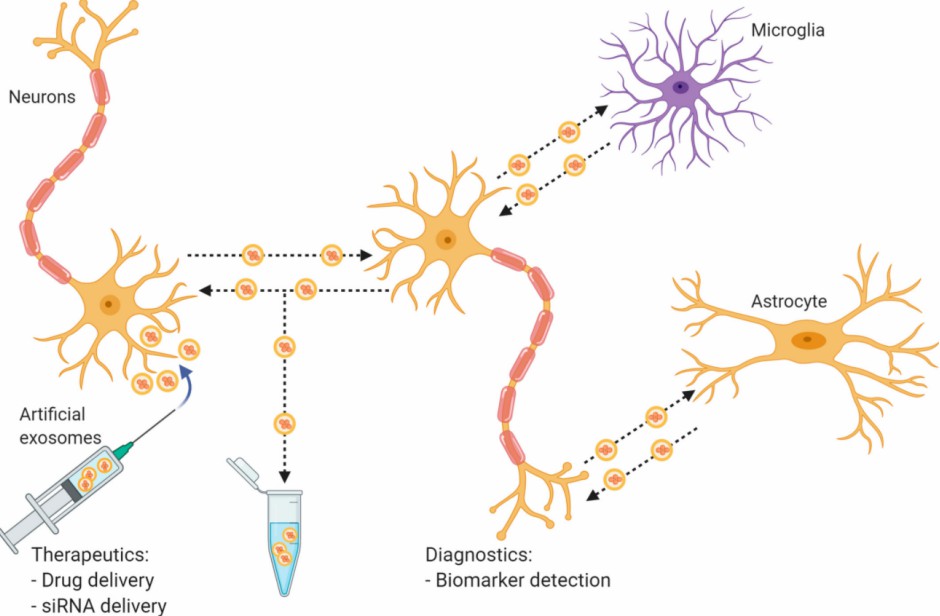Parkinson's Disease Exosome Research Solution
Online InquiryParkinson's disease (PD) is a debilitating progressive motor disorder and the second most common neurodegenerative disease in the world after Alzheimer's disease (AD). Degeneration of the nigrostriatal dopaminergic pathway, i.e., the formation of misfolded and aggregated α-synuclein, is a key neuropathological hallmark of this disease. A growing body of research suggests that exosomes, a type of extracellular vesicle (EV), are one of the potential mechanisms by which pathological α-synuclein propagates throughout the brain. The ability of exosomes to transport active substances between cells, including microRNAs (miRNA) and mRNA implicated in PD pathology, provides key insights into how exosomes contribute to the development and progression of PD. Research on exosomes as potential tools to modulate PD pathology has also progressed. Exosomes can be used not only as a non-invasive biomarker for PD diagnosis but also as drug delivery for PD therapy.
 Fig. 1 Potential roles of exosomes in neuropathology and clinical applications. (Pinnell, Jennifer R., Mei Cui, and Kim Tieu., 2021)
Fig. 1 Potential roles of exosomes in neuropathology and clinical applications. (Pinnell, Jennifer R., Mei Cui, and Kim Tieu., 2021)
Exosomes in Parkinson's Disease
PD is a hypokinetic movement disorder. Parkinson's patients may have non-motor symptoms and motor abnormalities. The motor symptoms arise from the loss of dopaminergic innervation of the motor nucleus in the basal ganglia region, resulting in bradykinesia (slow movement), rigidity, postural instability and resting tremor. While non-motor symptoms usually include depression, sleep disturbances, olfactory dysfunction, and gastrointestinal changes, some of which appear in the prodromal period before the onset of motor abnormalities. The underlying etiology of PD is multifactorial and a complex interplay of genetic and environmental risk factors can lead to increased disease risk. Cells such as neurons, astrocytes and microglia have been found to release exosomes in the brain. Exosomes are important information transporters between cells that carry substances that can influence gene expression and protein activity in recipient cells, making them a major possibility for regulating protein misfolding in PD.
Parkinson's Disease exosome research solution at Creative Proteomics
Creative Proteomics is a leading service provider focused on subcellular and single-cell level research. Our capability can help solve problems in exosome research, from optimal exosome hierarchical separation, enrichment of assay substances, liquid chromatography-mass spectrometry analysis to data processing and analysis, and ultimately obtaining relative relationships between target assay substances and physiological and pathological changes. We are committed to helping our customers to support large-scale exosome vectors with high loading efficiency and new exosome fractions as biomarkers for better treatment and diagnosis of PD.
| Exosome analysis services | |
|---|---|
| Exosome isolation and purification | Sucrose gradient centrifugation |
| Polymer-based exosome enrichment method | |
| Immunomagnetic bead method | |
| Size exclusion chromatography method | |
| Exosome identification | Nanoparticle tracking analysis (NTA) |
| Electron microscopy analysis | |
| Western blot | |
| Exosome marker assay | Isolation and enrichment of exosomal CD9, CD63, CD81, TSG101, HSP70 proteins |
| Exosome surface protein identification and quantitative analysis | |
| Exosome engineering | Exosome labeling and tracking |
| Cargo loading | |
| Engineered exosome production | |
| Cargo loading assessment | |
| Exosomes labeling and tracking | Exosome fluorescent labeling |
| Fluorescence exosome purification | |
| Fluorescent exosome concentration labeling | |
| Exosome multiomics analysis | Exosome proteomics analysis: Exosome protein profile identification Exosome protein composition analysis Exosome protein expression level analysis Exosome protein differential expression analysis |
| Exosome metabolomics analysis: Exosome differential metabolite screening Qualitative and quantitative analysis of target metabolites/metabolic pathways | |
| Exosome lipidomics analysis: Exosome lipid composition and level analysis Differential expression analysis of exosomal lipid molecules Qualitative and quantitative analysis of targeted lipid molecules | |
| Exosomal biogenesis and identification | Our capabilities will provide strong support for the study of exosome biogenesis and its identification. |
| Exosomal cargo and loading mechanism | Our services can greatly help the study of exosomal cargo and loading mechanism, facilitating the diagnostic and therapeutic applications of exosomes. |
| Exosome function research | In vitro analysis of the function of exosomes In vivo analysis of the function of exosomes |
Our capability to support PD exosome research
- Exosomes as a potential vehicle for drug delivery in PD
As drug vehicles, exosomes have the potential to overcome biocompatibility, blood-brain barrier penetrability, metabolic stability, and target specificity. The EVs have been successfully loaded with small interfering RNA (siRNA), catalase mRNA, catalase, and dopamine for PD treatment. We support exosomes loaded with defined therapeutically active molecules, such as siRNA, long non-coding RNAs (lncRNAs), and proteins to the brain.
- Exosomes as biomarkers in PD
We emphasize that exosomes are sensitive and reliable diagnostic biomarkers for PD and support the development of exosomes from cerebrospinal fluid, urine, saliva, serum, and plasma as biomarkers for the diagnosis of PD.
- Further research of exosomes in the development and progression of PD
Exosomes have two major roles in PD pathogenesis involving their role as important mediators of intercellular α-syn delivery and their ability to transport PD-associated RNAs, particularly miRNA, between cells. We offer exosome basic research and analysis services to further explore their potential role in PD.
References
- Yu, Haiyang, et al. "Potential roles of exosomes in Parkinson's disease: from pathogenesis, diagnosis, and treatment to prognosis." Frontiers in cell and developmental biology 8 (2020): 86.
- Pinnell, Jennifer R., Mei Cui, and Kim Tieu. "Exosomes in Parkinson disease." Journal of neurochemistry 157.3 (2021): 413-428.
- Luo, Siqi, Libo Du, and Yan Cui. "Potential therapeutic applications and developments of exosomes in parkinson's disease." Molecular Pharmaceutics 17.5 (2020): 1447-1457.
* For Research Use Only. Not for use in diagnostic procedures.



